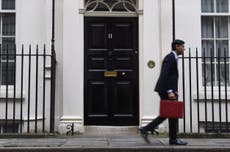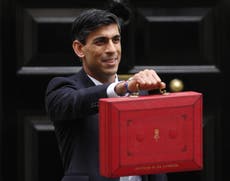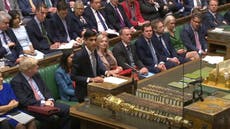With this huge spending binge, it seems Rishi Sunak found the entire magic money forest
The Thatcherite right won its beloved Brexit but in its wake, the Tory Party has hitched itself to a once-maligned economic model

Ask yourself a question: If Rishi Sunak was the shadow chancellor, what would he have said had the Labour Party unveiled what the Office for Budgetary Responsibility described as the “biggest giveaway since 1992”?
It’s an interesting thought experiment to conduct.
There were times when Sunak, a man described as a “stooge” when he was hurriedly appointed to replace Sajid Javid, but in somewhat more flattering terms by the time he sat down, sounded like Gordon Brown on speed as he delivered his first budget.
Here’s some extra billions for the NHS, and we’ve got some for education too, and for business, well, smaller businesses that we’re making life extremely difficult for with Brexit, and for innovation, and for levelling up, and to build bridges and stuff.
And you know what, let’s have a few more billions to cover the country in tarmac so people can whizz around in their cars.
Just moments earlier, he’d claimed the government would leave the environment in a better state than it found it. Erm…
Did someone say something about paying for it all? Tish and pish. It’s only the Labour Party that has to worry about balancing the books and revenue-raising. Didn’t you know that?
We can do all these lovely things within our fiscal rules, and yes that even includes the emergency stimulus package to cope with the coronavirus. It included temporarily scrapping business rates for smaller retailers, venues and other places people might be inclined to avoid for the next couple of months, loans and financial support for small firms, help with providing statutory sick pay.
Mr Sunak appears to want us to believe that he’s a magician and a forest of magic money trees have grown up around No 11 Downing Street with the cash that’s been allocated for new plantings.
PS: He is planning to review the government’s fiscal rules. Don’t be surprised if he has some shiny new ones in place saying that big borrowing budgets are a-ok when we go through this again in the autumn
There was some cash raised through reforming Entrepreneurs Relief, which lowers capital gains tax bills for those selling their businesses. It was capped at £1m, down from £10m, over a lifetime. A hit will be taken by a relatively small number of people who can afford it.
It was confirmed, too, that corporation tax is staying at 19 per cent, rather than being cut to 17 per cent, but that had been trailed. There were also the usual promises to crack down on tax avoidance, and some green taxes will be phased in.
But Sunak passed on the most obvious green revenue-raising measure, which was increasing fuel duty. It bears repeating that oil prices have crashed, thanks to the Saudis and the Russians turning on the taps. There has never been a more sensible, or necessary, time to call time on the fuel duty freeze but the chancellor ducked it to keep the Tory tabloids sweet.
Sunak, and his boss Boris Johnson, who was clearly closely involved in the broad direction of travel, otherwise shot a lot of sacred Tory cows including the one mooing about the importance of living within our means even if that means a miserable 10 years of austerity through which some people suffer terrible hardships.
I wrote this morning that this would be an epochal budget; one of those that live long in the memory for representing a change in direction. It was surely that.
Sunak and Johnson have been helped no end by the fact that borrowing is very cheap, and lenders are very willing to pony up cash, which makes doing this sort of thing an awful lot easier.
But Paul Johnson, director of the Institute for Fiscal Studies, noted that the government is now planning for growth of 2.8 per cent in public spending, with investment spending jumping by even more, which is greatly in excess of even the more optimistic forecasts of pre-Covid19 economic growth.
“Something has to give,” he wrote.
Things could indeed get interesting if Sunak’s largesse doesn’t deliver the boost to economic growth he’s hoping for, or just if Brexit breaks things (you can still count on that).
There were still some notable misses from the spending binge.
If Mr Sunak had given a little more thought to raising revenue, he might have been able to direct some of it towards the social care crisis.
It was perhaps the most glaring omission, but measures to address the poverty austerity has ushered in was another.
Those misses, and the complete volte-face on what the Tories have been telling us for years, gave the left something to attack.
But the right, especially the economically dry Thatcherite part of it, seemed crosser still.
“Spending like a drunken sailor won’t work,” snarled the Adam Smith Institute. “The chancellor seems to think the only best way to boost growth is through public spending,” growled the Institute of Economic Affairs.
The Thatcherite right won its beloved Brexit but in its wake, its party has hitched itself to a new, and very different, economic model from the one they’ve always favoured.








Join our commenting forum
Join thought-provoking conversations, follow other Independent readers and see their replies
Comments